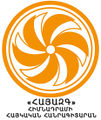Mahari Gurgen
From Hayazg.info
Revision as of 11:23, 30 July 2017 by Aghazanchyan (talk | contribs)
Contents
Biography
Was born on August 1, 1903 in Van, the Western Armenia (now Turkey).
Education
- Studied at the "Norashen" and "Yeramyan" colleges, later at the YSU at the historical-linguistic faculty.
Work Activity
- started his creative life with the poems "Titanic" (1926), "The Poplars" (1927) and the digest "Mrgahas", which particularly brought him lierary recognition, including ballads and poems.
- Had begun to prose since the late 1920s, as a result of which published his digests "About Love, Jealousy and the Partisans of Nizza" (1929) and " In Zigzags"- a collection of short stories (1931).
- The trilogy "The Childhood" (1928), "The Adolescence" (1929-1930) and "The Youth Shadow" (written during his second exile in 1952-1955) presents the experiences of Mahari's personal life.
- In 1950s Mahari's creative life gained a new impetus when the digests "The Hearths" (1959), "The Voice of Silence" (1962), and the novel "The Burning Orchards" (1966) were published.
Achievements
- In 1934 became a member of the Writers' Union of the USSR.
- In 1965 became an honoured figure in culture of the Armenian SSR.
- Was awarded the State Prize posthumously for the novel "The Bloomed Barbed Wires".
Other
- When he was only 8, his uncle shot his father allegedly accidently.
- In 1915 while migrating to the Eastern Armenia his uncle left his mother, sister and her family, died Gurgen's grandmother, later he lost his relatives and along with other refugees went to the Eastern Armenia.
- In 1915 sheltered in the orphanages of Dilijan and Yerevan, where he got acquainted with Charents Yeghishe.
- In 1917 began Mahari's creative biography when his first poem was published in the magazine "Work" ("Աշխատանք") under the name "G. Arpuni".
- In 1918 published poems in the magazines "Work", "Van-Tosp" and many others.
- In 1936 was arrested, and on August 20, 1947 was exempted from exile, returned to Yerevan, where his wife had already abandoned him, and his mother died.
- In November, 1949 was once again exiled to Siberia as an immoral element, but this time as a free exile, not as a detainee, and in summer of 1954 was exempted and returned to Yerevan.
- During the second exile, got acquainted with his second wife, a Lithuanian woman Antonina Povilaityte, got married in 1952 and had two children, a boy and a girl.
- On July 16, 1969 died in Palanaga, leaving the novels "The Youth" and "Brave Nazar" half-written and was buried in Yerevan.
- One of the streets of Yerevan's Erebuni administrative district and School №176 in Yerevan bear Gurgen Mahari's name.
Images
Videos
Press Publications
Bibliography
- Author's Surname Name Middle Name,Book title, Yerevan, YSU publishing house., 0000:
- Author's Surname Name Middle Name,Article Title, Journal Name, Yerevan, 0000, number 2, page 41-45:
See also
- Ով ով է.հայեր(կենսագրական հանրագիտարան:Երկու հատորով),ՀՀ խմբ. հանձնաժողով՝ Հ. Մ. Այվազյան (գլխ. խմբագիր) և ուրիշներ,Երևան,Հայկական հանրագիտարան հրատ.,Հ.1,Աբալյան-Ղուշչյան,2005:

